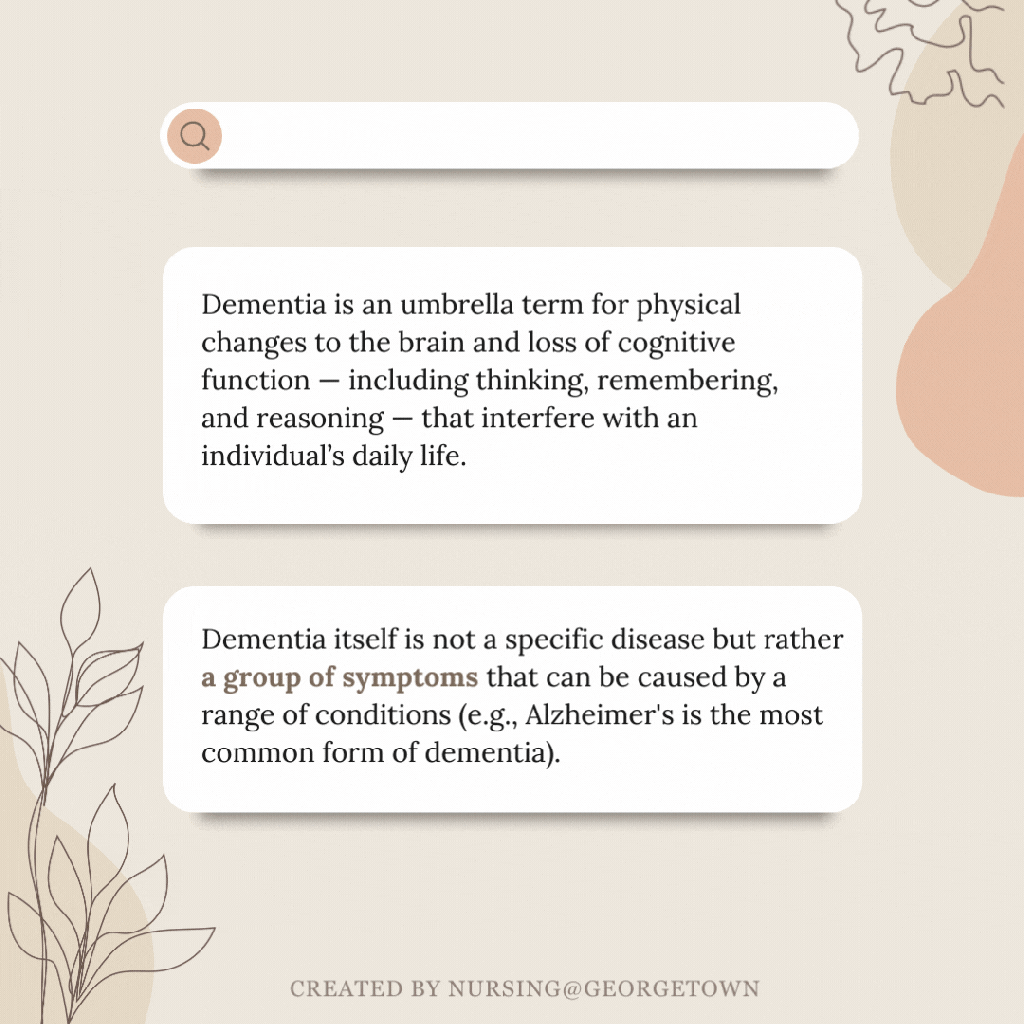How Caregivers Can Navigate a Loved One’s Dementia Diagnosis

Dementia often comes with deep emotional complications not only for patients but also for their caregivers and loved ones. Karen McCrea, DNP, FNP-C, has experienced that toll firsthand at both the personal and professional level. As a nurse practitioner, she has worked with patients and families affected by dementia. Within McCrea’s family, her father and grandmother were diagnosed with dementia, and McCrea served as the primary health care proxy for her grandmother until her death.
“In most other chronic illnesses, yes, the family also is impacted by the diagnosis and its management. But I think that is just amplified in dementia,” said McCrea, a nursing faculty member at Georgetown University School of Nursing. “Often the patient is not really cognizant or aware of the stress that is being imparted elsewhere because of the diagnosis, and the vast majority of stress I think actually comes on the caregiver’s part and the family and loved ones’ part.”
This guide for caregivers offers information about the different types of dementia, tips for communicating with loved ones with dementia, advice for practicing self-care while caregiving, and a roundup of resources with additional information.
What Is Dementia?
Dementia is an umbrella term for physical changes to the brain and loss of cognitive function — including thinking, remembering, and reasoning — that interfere with an individual’s daily life. Dementia itself is not a specific disease but rather a group of symptoms that can be caused by a range of conditions (e.g., Alzheimer’s is the most common form of dementia). Symptoms associated with dementia may be mild to severe, and they vary based on the type of dementia and its progression. Although dementia is more common in older individuals, it is not a normal part of aging.
“One of the frustrating things about dementia is it is progressive,” McCrea said. “There’s a known end outcome, and there is not much we can do to turn that progression around.”

What Causes Dementia?
Dementia can be caused by a range of diseases and can present differently based on the individual. In some cases, individuals may be diagnosed with mixed dementia caused by multiple conditions.
Types of Dementia
Alzheimer’s disease affects memory, thinking, and behavior and is the most common form of dementia.
Symptoms:
- difficulty remembering new information
- disorientation and confusion
- mood and behavior changes
- unfounded suspicions about family, friends, and caregivers
- trouble swallowing, speaking, and walking
Age of onset: Most individuals who have Alzheimer’s are 65 and older.
Frontotemporal degeneration (FTD), also known as frontotemporal lobar degeneration or Pick’s disease, is a brain disorder caused by degeneration of frontal and/or temporal lobes of the brain. Patients with FTD typically do not experience severe memory loss, unlike those with other types of dementia.
Symptoms:
- decline in movement, behavior, and/or language
- difficulty planning, organizing, and communicating
- inappropriate behavior in social or work settings
- trouble relating to loved ones
- predisposition to pneumonia and other infections
Age of onset: The condition most often affects individuals ages 45–64, and it is the most common form of dementia in people under 60.
Lewy body dementia (LBD) is a multisystem disease that includes two diagnoses: dementia with Lewy bodies and Parkinson’s disease dementia. In individuals with LBD, abnormal deposits of alpha-synuclein proteins — “Lewy bodies” — change chemicals in the brain. In dementia with Lewy bodies, dementia symptoms appear first and may be followed by physical complications similar to Parkinson’s disease. In Parkinson’s dementia, the physical symptoms of Parkinson’s appear first, followed by cognitive impairment (PDF, 172 KB).
Symptoms:
- trouble with problem-solving, remembering new information, planning, or concentrating
- daytime fatigue
- movement problems, such as rigidity, shuffling, trouble with balance, or tremors
- hallucinations
- trouble sleeping, including acting out dreams or falling out of bed
Age of onset: Most patients are 50 and older.
Vascular dementia is dementia caused by conditions that interrupt blood flow to the brain and damage blood vessels in the brain. The condition can be related to strokes.
Symptoms:
- gradual or sudden changes to memory, thinking, personality, and behavior
- difficulty following directions and/or performing tasks that were previously easy
- trouble learning new information or routines
- problems with language
- changes in sleep
- hallucinations or delusions
Age of onset: Most patients are 65 and older, and the risk increases with age.
Other conditions that are linked to dementia include the following:
- Creutzfeldt-Jakob disease
- Down syndrome
- Huntington’s disease
- Korsakoff syndrome
- normal pressure hydrocephalus
- posterior cortical atrophy
- traumatic brain injury
Considerations for Dementia Caregivers
Dementia comes with a lot of uncertainty, and the velocity of its progression varies from person to person. Documenting end-of-life wishes and health care directives ahead of a dementia diagnosis can help guide difficult care choices that family may have to make when an individual with dementia is unable to make decisions for themselves. Creating care plans, doing estate planning, crafting living wills, and assigning health care proxies may help alleviate conflict between family members who want different things for loved ones with dementia.
“Having things very clearly outlined on what the individual would want — even when they cannot speak for themselves — takes some of that guesswork out of it and leaves the control with the patient or the person with dementia.”
“Having things very clearly outlined on what the individual would want — even when they cannot speak for themselves — takes some of that guesswork out of it and leaves the control with the patient or the person with dementia,” McCrea said. “It helps. I won’t say it stops that issue, but at least it is, ‘this is what Mom wanted,’ or, ‘this is what Dad wanted,’ and it is not up to you to change what they wanted.”
Documenting wishes may help dementia caregivers navigate difficult decisions, such as:
- setting boundaries around physical safety, levels of independence, and financial well-being
- determining where an individual with dementia will live, which can come with a range of financial costs and emotional burdens
- balancing risks and benefits of medication to treat dementia, which does not cure the condition but can come with significant side effects.
Tips for Communicating With Individuals With Dementia
As an individual’s dementia progresses, it can become increasingly difficult for those around them to create meaningful interactions. Finding conversation topics when the individual cannot remember recent events can be challenging and becomes harder as the condition progresses. Caregivers and loved ones should alter their expectations about what they will get out of interactions with someone with dementia as their condition advances.
Dementia can also create stressful situations when individuals behave unpredictably or do not understand what is going on. During difficult interactions, McCrea suggests remembering that the disease is responsible for the tension, not the individual.
“It’s not that your loved one is trying to push your buttons or hit your hot topics or drive you to the brink of frustration. They don’t have a concept of what that is looking like,” she said. “It is OK to step back and say, ‘You know what? I’m going to revisit this another time.’”
Taking breaks and revisiting a conversation later can help reset the mood.
“Make sure they are safe — whether that is with a caregiver or they are in a place where they are safe — and you take a break and then come back to it,” McCrea said. “Every day is a new day.”
How to Talk To Someone With Dementia
The following considerations from the Alzheimer’s Association may help caregivers communicate with their loved ones with different stages of dementia — from those in the early stage to individuals with advanced dementia.

Communicating With Someone
With Early-Stage Dementia
- Do not make assumptions about an individual’s communication ability; dementia affects all patients differently.
- Discuss the individual’s preferred communication method: Do they prefer to have conversations face-to-face, on the phone, through text, or via email?
- Include individuals with dementia in conversations, and speak directly to them rather than to their caregiver or partner.
- Listen and give the individual time to respond, and avoid interrupting when they are speaking.
- Use humor and laugh at communication mishaps.
- Do not pull away from the individual because they have dementia.

Communicating With Someone
With Middle-Stage Dementia
- Converse one-on-one in a quiet environment.
- Speak slowly and clearly.
- Ask one question at a time, using yes or no questions.
- Give plenty of time for the individual to respond, be patient with them, and offer reassurance.
- Repeat what the individual said back to them to clarify.
- Make eye contact, and give visual cues to assist in verbal communication.
- Use written notes for assistance if words are confusing.
- Avoid arguing, criticizing, or correcting an individual with dementia.

Communicating With Someone
With Late-Stage or Severe Dementia
- Approach the person from the front and identify yourself.
- Encourage nonverbal communication, and ask the individual to point or gesture if it is difficult to understand what they are saying.
- Use all five senses to communicate.
- Consider the emotions behind words and sounds, rather than the words themselves.
- Treat the individual with dignity and respect, and do not talk to others as if the individual with dementia were not there.
- Remember being present is more important than knowing what to say.
Communications Tools and Technology to Help Dementia Patients
The tools below may help individuals with dementia communicate more effectively.
Adapted phones or tablets with pre-programmed numbers, larger buttons, and/or video chat functions can make it easier for dementia patients to contact loved ones.
Mobile apps can help with functional communication, behavior management, social engagement, and caregiver support. The American Speech-Language-Hearing Association offers suggestions for apps for patients with middle- to late-stage dementia.
Memory aids, such as reminder messages, alarms, or written notes, can help individuals with dementia remember to complete certain tasks at certain times of day, including taking medication, locking doors, or going to sleep.
Speech-language pathologists can work with dementia patients as well as their caregivers (PDF, 139KB) to integrate effective communication strategies.
Self-Care Tips for Dementia Caregivers
Whether a caregiver lives with an individual with dementia or visits them regularly to support their care and well-being, it is important for caregivers to prioritize their own mental and physical health.
“It’s really easy to get submerged into the needs of the loved one and forget to take care of yourself.”
“It’s really easy to get submerged into the needs of the loved one and forget to take care of yourself,” McCrea said. “You want to take really good care of your loved one, but you cannot do that unless you take good care of yourself because if you are not healthy, your loved one is not going to be healthy. If you are neglecting your health care and you have a catastrophic event, what happens with your loved one?”
She recommends all dementia caregivers seek counseling to support their own mental and emotional health.
“There are a lot of emotions that go along with caretaking for anybody, regardless of what their chronic illness might be,” McCrea said. “Dementia, I think, takes a really big toll in its own special way.”
How Dementia Caregivers Can Practice Self-Care
For all caregivers
- Ask for help when needed.
- Seek counseling to support mental wellness.
- Take advantage of local services available to assist with caregiving.
- Join a virtual or in-person dementia support group for caregivers.
- Take care of the basics: Nourish yourself, exercise, and sleep well.
For caregivers living with
a dementia patient
- Take breaks during the day.
- Bring in respite care if possible.
- Learn the signs a loved one is experiencing discomfort and their triggers to avoid meltdowns.
Dementia Resources for Caregivers
Support through the organizations, groups, help lines, and other resources below may help caregivers find additional assistance for themselves and loved ones with dementia.
Dementia Organizations
The Alzheimer’s Association offers a breadth of resources, information, and research about Alzheimer’s and dementia. Its resources for caregivers include:
The Alzheimer’s Foundation of America supports individuals with Alzheimer’s and related dementias, as well as their families and caregivers. The foundation’s resources include:
Alzheimers.gov is a federal effort of the U.S. Department of Health and Human Services to improve the lives of individuals with dementia, their families, and caregivers. The portal’s resources include:
Caregiver Action Network is an organization that works to improve the lives of individuals caring for loved ones with chronic conditions, including dementia. The network’s offerings for dementia caregivers include:
Dementia Friendly America is a network of communities and organizations that aims to create spaces that support individuals with dementia and their caregivers. Its resources for caregivers and providers include:
The Family Caregiver Alliance works to improve quality of life for family caregivers and those in their care. The organization provides resources for caregivers of people with a range of conditions, and some of the resources for dementia caregivers include:
Hilarity for Charity is a nonprofit organization founded by Seth Rogen and Lauren Miller Rogan that works to support families affected by Alzheimer’s and advance brain health research, education, and advocacy. For caregivers, its resources include:
Dementia Support Groups and Communities
Dementia Help Lines
Other Dementia Resources
- American Academy of Family Physicians: Caregiver Resources
- Alzheimer’s Prevention Registry: Resources for Alzheimer’s Caregivers
- Cleveland Clinic Healthy Brains: Clinical Trials
- Eldercare Locator: Caregiver Corner
- National Alliance for Caregiving: Resources: Help for Caregivers
- National Institute on Aging: Getting Help With Alzheimer’s Caregiving
- U.S. Department of Veterans Affairs: Caring for Dementia: What to Expect
Please note that this article is for informational purposes only. Individuals should consult their health care provider before following any of the information provided.
Citation for this content: Nursing@Georgetown, the online MS in Nursing, DNP, and Post-Graduate Certificate programs from Georgetown University School of Nursing.


